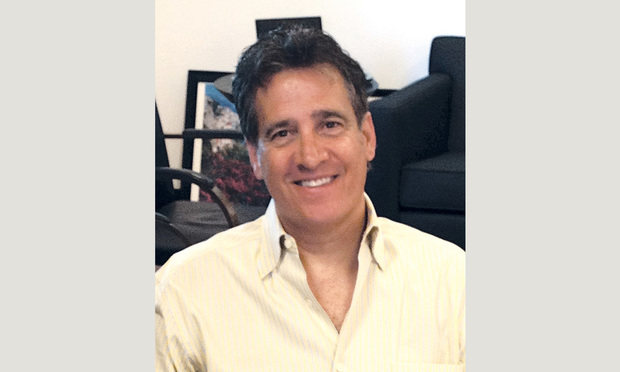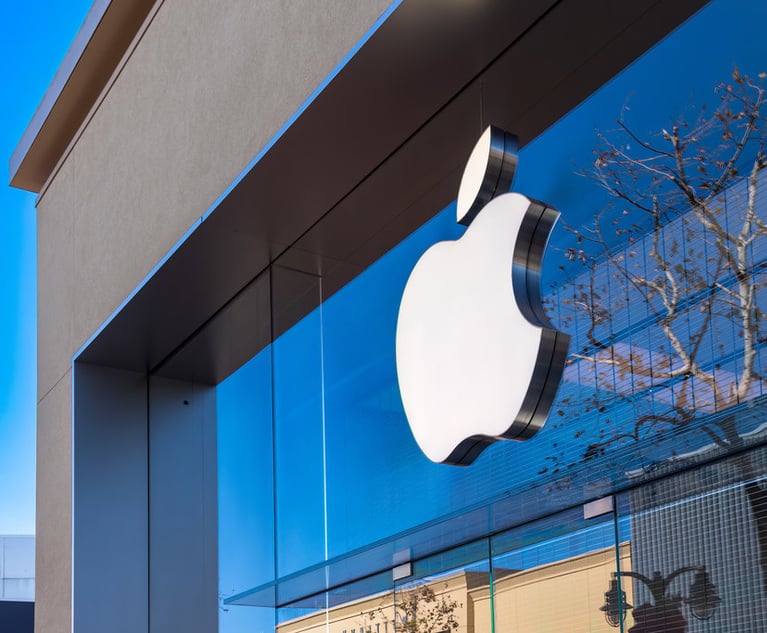No Expert? No Problem for NPE in ND-Cal Patent Trial
Friedman, Suder & Cooke partner Jonathan Suder of Texas is feeling pretty good about San Francisco judges and juries after winning a $6.6 million verdict for OptiCurrent LLC.
February 27, 2019 at 02:22 PM
4 minute read
 Jon Suder, a partner with Fort Worth's Friedman, Suder & Cooke.
Jon Suder, a partner with Fort Worth's Friedman, Suder & Cooke.
A Texas nonpracticing entity has scored an unlikely trial victory in the Northern District of California, winning a $6.6 million verdict, plus ongoing royalties, despite the exclusion of its damages expert.
Friedman, Suder & Cooke partner Jonathan Suder, lead attorney for OptiCurrent LLC and inventor James Congdon, said that based on future royalties and additional infringing products, the verdict is likely worth more than $20 million.
“This verdict, from the Northern District of California, shows that all inventors must be respected no matter how big or small they are,” Suder said.
At issue in OptiCurrent v. Power Integrations was U.S. patent 6,958,623, a three-terminal noninverting transistor designed to minimize currency leakage. Congdon, a Stanford-trained electrical engineer, built a prototype on a breadboard and drew a sketch of the invention in 1997. He applied for a patent four years later and obtained it in 2005.
In the meantime, Congdon licensed a similar invention to a company called QBar, but QBar was not a commercial success. Congdon instead partnered with Brad Brunell, a former executive at Microsoft and Acacia Research Corp., to form OptiCurrent in 2012, according to Suder.
The company sued Power Integrations, a supplier of circuits used in power conversion systems, in the Eastern District of Texas in 2016. The case was transferred to Northern California and Judge William Orrick III not long after the U.S. Supreme Court's 2017 venue decision in TC Heartland.
Orrick ruled in April that Congdon's sketch was not admissible to establish the 1997 priority date, but he reconsidered after OptiCurrent produced a witness who had signed and dated it. Power Integrations argued it was too late, but Orrick allowed it because he saw no evidence of bad faith.
Orrick was not as forgiving when it came to OptiCurrent expert witness Larry W. Evans, who estimated damages at $18 million. Evans had assumed a hypothetical negotiation between OptiCurrent and Power Integrations in 2006, but OptiCurrent didn't exist until 2012. Evans also relied on a $140 million verdict Power Integrations won against Fairchild Semiconductor in 2015, but the Federal Circuit had vacated it.
Instead, OptiCurrent had to rely on the QBar license and Power Integrations sales data. Orrick also struck Power Integrations' expert testimony on patent validity.
“We got a great judge in Judge Orrick,” Suder said Tuesday. “He did real well by us, even though he struck our damages expert.”
Orrick had another case to try, so the matter was reassigned to Judge Edward Chen, whom Suder enthused about as “a real trial judge.”
At trial, OptiCurrent showed the jurors the breadboard prototype, which Congdon still owns. He explained how he'd built it with parts bought from Radio Shack. He told jurors he'd waited four years to apply for the patent because he couldn't afford to until then.
On Monday, jurors awarded a 3-percent royalty on sales of $222 million. Suder said the patent still has three more years to run, and he anticipates further recovery over accused products that were excluded from this trial.
The reality of a win in territory where nonpracticing entities are often characterized as “patent trolls” was still sinking in Tuesday morning on Suder, whose firm is based in Fort Worth, Texas.
“The fact that we did this in the Northern District of California,” he said. “A non-practicing entity took on a local, large semiconductor company and won. And we did it without an expert.”
Suder was quick to clarify that he got considerable help from his technical expert, Regan Zane. Also with him at trial were Friedman Suder partners Corby Vowell and Dave Gunter.
Power Integrations was represented by Fish & Richardson, which declined to comment. Fish has won several patent infringement verdicts for Power Integrations against rival Fairchild and its successor.
This content has been archived. It is available through our partners, LexisNexis® and Bloomberg Law.
To view this content, please continue to their sites.
Not a Lexis Subscriber?
Subscribe Now
Not a Bloomberg Law Subscriber?
Subscribe Now
NOT FOR REPRINT
© 2025 ALM Global, LLC, All Rights Reserved. Request academic re-use from www.copyright.com. All other uses, submit a request to [email protected]. For more information visit Asset & Logo Licensing.
You Might Like
View All

'A Never-Ending Nightmare': Apple Sued for Alleged Failure to Protect Child Sexual Abuse Survivors

'The Hubris of Big Tech': Apple Hit With California Labor Lawsuit for Alleged Free Speech, Privacy Violations

Jury Says $118M: Netlist Wins Another Patent Verdict Against Samsung
4 minute readTrending Stories
- 1'A Death Sentence for TikTok'?: Litigators and Experts Weigh Impact of Potential Ban on Creators and Data Privacy
- 2Bribery Case Against Former Lt. Gov. Brian Benjamin Is Dropped
- 3‘Extremely Disturbing’: AI Firms Face Class Action by ‘Taskers’ Exposed to Traumatic Content
- 4State Appeals Court Revives BraunHagey Lawsuit Alleging $4.2M Unlawful Wire to China
- 5Invoking Trump, AG Bonta Reminds Lawyers of Duties to Noncitizens in Plea Dealing
Who Got The Work
J. Brugh Lower of Gibbons has entered an appearance for industrial equipment supplier Devco Corporation in a pending trademark infringement lawsuit. The suit, accusing the defendant of selling knock-off Graco products, was filed Dec. 18 in New Jersey District Court by Rivkin Radler on behalf of Graco Inc. and Graco Minnesota. The case, assigned to U.S. District Judge Zahid N. Quraishi, is 3:24-cv-11294, Graco Inc. et al v. Devco Corporation.
Who Got The Work
Rebecca Maller-Stein and Kent A. Yalowitz of Arnold & Porter Kaye Scholer have entered their appearances for Hanaco Venture Capital and its executives, Lior Prosor and David Frankel, in a pending securities lawsuit. The action, filed on Dec. 24 in New York Southern District Court by Zell, Aron & Co. on behalf of Goldeneye Advisors, accuses the defendants of negligently and fraudulently managing the plaintiff's $1 million investment. The case, assigned to U.S. District Judge Vernon S. Broderick, is 1:24-cv-09918, Goldeneye Advisors, LLC v. Hanaco Venture Capital, Ltd. et al.
Who Got The Work
Attorneys from A&O Shearman has stepped in as defense counsel for Toronto-Dominion Bank and other defendants in a pending securities class action. The suit, filed Dec. 11 in New York Southern District Court by Bleichmar Fonti & Auld, accuses the defendants of concealing the bank's 'pervasive' deficiencies in regards to its compliance with the Bank Secrecy Act and the quality of its anti-money laundering controls. The case, assigned to U.S. District Judge Arun Subramanian, is 1:24-cv-09445, Gonzalez v. The Toronto-Dominion Bank et al.
Who Got The Work
Crown Castle International, a Pennsylvania company providing shared communications infrastructure, has turned to Luke D. Wolf of Gordon Rees Scully Mansukhani to fend off a pending breach-of-contract lawsuit. The court action, filed Nov. 25 in Michigan Eastern District Court by Hooper Hathaway PC on behalf of The Town Residences LLC, accuses Crown Castle of failing to transfer approximately $30,000 in utility payments from T-Mobile in breach of a roof-top lease and assignment agreement. The case, assigned to U.S. District Judge Susan K. Declercq, is 2:24-cv-13131, The Town Residences LLC v. T-Mobile US, Inc. et al.
Who Got The Work
Wilfred P. Coronato and Daniel M. Schwartz of McCarter & English have stepped in as defense counsel to Electrolux Home Products Inc. in a pending product liability lawsuit. The court action, filed Nov. 26 in New York Eastern District Court by Poulos Lopiccolo PC and Nagel Rice LLP on behalf of David Stern, alleges that the defendant's refrigerators’ drawers and shelving repeatedly break and fall apart within months after purchase. The case, assigned to U.S. District Judge Joan M. Azrack, is 2:24-cv-08204, Stern v. Electrolux Home Products, Inc.
Featured Firms
Law Offices of Gary Martin Hays & Associates, P.C.
(470) 294-1674
Law Offices of Mark E. Salomone
(857) 444-6468
Smith & Hassler
(713) 739-1250






